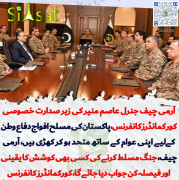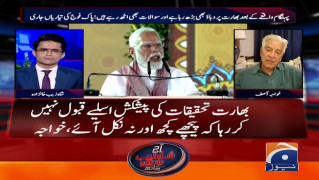canadian
Chief Minister (5k+ posts)
Glitch in the system
Dr Maleeha Lodhi (PAKISTAN)
20 May 2011, 8:23 PM
It may be too early to assess the security ramifications and political fallout in Pakistan of the killing of Osama bin Laden by a clandestine American assault mission last week.
But what is widely seen as a failure of the entire system has already shaken public confidence in the countrys security arrangements and damaged the credibility of its managers. The governments inept handling of the aftermath has left the nation adrift and in a state of bewilderment.
What happened on May 2 was not just a failure of intelligence. To construe it in these narrow terms is to miss the bigger picture, draw the wrong conclusion and be denuded of the means to fix the fundamental problem.
This was a failure of state institutions, leadership, and imagination. Not to have envisaged that such an intervention could occur if the United States had the worlds most wanted man in its sights and about which its top officials had long warned, points to an inability to recognise much less take steps to avert a likely scenario.
The covert US raid marked a systemic breakdown in which the national security apparatus was tested and found wanting. Two telling vulnerabilities were exposed: an incapacity to protect the country from external intrusion and the inability to defend against the terrorist threat, which Bin Ladens long and undetected presence in a garrison town signified.
Unless all the dimensions of this failure are identified and addressed in a wide-ranging review of national secuTrity procedures and structures the countrys defences will continue to be at risk of being breached. Nor will people have any credible assurance that Pakistans strategic capability is secure from the possibility of penetration from outside.
I was in the US and then the UK as the story of the raid unfolded. The hostile media coverage of Pakistan was unlike anything I had seen before. Official Pakistani silence in the first twenty-four hours exacerbated the situation and allowed the Western media to ramp up its accusations and all but hold the state responsible for complicity in harbouring Bin Laden. The lack of any serious or timely official attempt to reframe the issue meant that Pakistans case went by default.
More important than the criticism outside the country are the doubts raised within. Public questioning of the competence of the authorities has focused on the two dimensions of the May 2 incident mentioned earlier: how did a US covert operation undertaken deep inside Pakistani territory go undetected until it was over? And how did Bin Ladens presence in a place like Abbottabad for five years escape the attention of the authorities?
In the days following the clandestine operation, the official response that emerged was so incoherent that it heightened rather than assuaged public anxiety on these counts. The piecemeal release of information and shifting posture laid bare the utter disarray in the government.
Then came the acknowledgement in a statement from the Inter-Services Public Relations (ISPR) following a Corps Commanders Conference, of shortcomings in developing intelligence on the presence of Osama bin Laden in Pakistan and the Army leaderships promise of an investigation. But no details are yet available about the scope of this inquiry.
The inquiry will obviously have to examine how and why leads that the security agencies, by their own admission, provided to the US and that ultimately led the CIA to Bin Ladens home were not vigorously investigated by the Pakistani authorities themselves. Arguments that America has technical capabilities that Pakistan lacks are spurious on this count when all that our authorities needed was on-the-ground surveillance and human intelligence in the very town that saw the arrest just a few months ago of Umar Patek, one of the Bali bombers with close connections to Al Qaeda.
The question uppermost in the Pakistani public mind relates to the bigger, security failure rather than just that of intelligence. How was it that helicopters entered Pakistans airspace carrying an assault team, which conducted a 40-minute operation in Abbottabad and not some remote borderland which the concerned authorities were only alerted to when one of the Black Hawk helicopters crashed into the compound wall?
The official explanation heard so far of superior stealth technology trumping the countrys radar and early warning systems misses the point. If our defences can be breached in this manner and Pakistan does not possess the capability to overcome this vulnerability how can a repeat of such intrusions be deterred in the future?
The ISPR statement in which a warning was issued that Pakistan would not tolerate a repeat of any action that violated the sovereignty of Pakistan is not backed by any credible assurance that the country has the ability to deter such transgressions.
These questions urge a full and comprehensive review of the countrys security policy and procedures. For the review to be meaningful it must be undertaken in an independent and objective manner by credible figures with knowledge and expertise of the issues at hand. Its aim should be to address the obvious security weaknesses laid bare by the recent developments. It should have a time-bound and result oriented mandate as well as the competence to make recommendations. Its objective should be to identify the necessary steps that need to be taken to insure that the gaps in Pakistans security and intelligence are effectively and promptly plugged.
Dr Maleeha Lodhi served as Pakistans ambassador to the United States and the United Kingdom
Dr Maleeha Lodhi (PAKISTAN)
20 May 2011, 8:23 PM
It may be too early to assess the security ramifications and political fallout in Pakistan of the killing of Osama bin Laden by a clandestine American assault mission last week.
But what is widely seen as a failure of the entire system has already shaken public confidence in the countrys security arrangements and damaged the credibility of its managers. The governments inept handling of the aftermath has left the nation adrift and in a state of bewilderment.
What happened on May 2 was not just a failure of intelligence. To construe it in these narrow terms is to miss the bigger picture, draw the wrong conclusion and be denuded of the means to fix the fundamental problem.
This was a failure of state institutions, leadership, and imagination. Not to have envisaged that such an intervention could occur if the United States had the worlds most wanted man in its sights and about which its top officials had long warned, points to an inability to recognise much less take steps to avert a likely scenario.
The covert US raid marked a systemic breakdown in which the national security apparatus was tested and found wanting. Two telling vulnerabilities were exposed: an incapacity to protect the country from external intrusion and the inability to defend against the terrorist threat, which Bin Ladens long and undetected presence in a garrison town signified.
Unless all the dimensions of this failure are identified and addressed in a wide-ranging review of national secuTrity procedures and structures the countrys defences will continue to be at risk of being breached. Nor will people have any credible assurance that Pakistans strategic capability is secure from the possibility of penetration from outside.
I was in the US and then the UK as the story of the raid unfolded. The hostile media coverage of Pakistan was unlike anything I had seen before. Official Pakistani silence in the first twenty-four hours exacerbated the situation and allowed the Western media to ramp up its accusations and all but hold the state responsible for complicity in harbouring Bin Laden. The lack of any serious or timely official attempt to reframe the issue meant that Pakistans case went by default.
More important than the criticism outside the country are the doubts raised within. Public questioning of the competence of the authorities has focused on the two dimensions of the May 2 incident mentioned earlier: how did a US covert operation undertaken deep inside Pakistani territory go undetected until it was over? And how did Bin Ladens presence in a place like Abbottabad for five years escape the attention of the authorities?
In the days following the clandestine operation, the official response that emerged was so incoherent that it heightened rather than assuaged public anxiety on these counts. The piecemeal release of information and shifting posture laid bare the utter disarray in the government.
Then came the acknowledgement in a statement from the Inter-Services Public Relations (ISPR) following a Corps Commanders Conference, of shortcomings in developing intelligence on the presence of Osama bin Laden in Pakistan and the Army leaderships promise of an investigation. But no details are yet available about the scope of this inquiry.
The inquiry will obviously have to examine how and why leads that the security agencies, by their own admission, provided to the US and that ultimately led the CIA to Bin Ladens home were not vigorously investigated by the Pakistani authorities themselves. Arguments that America has technical capabilities that Pakistan lacks are spurious on this count when all that our authorities needed was on-the-ground surveillance and human intelligence in the very town that saw the arrest just a few months ago of Umar Patek, one of the Bali bombers with close connections to Al Qaeda.
The question uppermost in the Pakistani public mind relates to the bigger, security failure rather than just that of intelligence. How was it that helicopters entered Pakistans airspace carrying an assault team, which conducted a 40-minute operation in Abbottabad and not some remote borderland which the concerned authorities were only alerted to when one of the Black Hawk helicopters crashed into the compound wall?
The official explanation heard so far of superior stealth technology trumping the countrys radar and early warning systems misses the point. If our defences can be breached in this manner and Pakistan does not possess the capability to overcome this vulnerability how can a repeat of such intrusions be deterred in the future?
The ISPR statement in which a warning was issued that Pakistan would not tolerate a repeat of any action that violated the sovereignty of Pakistan is not backed by any credible assurance that the country has the ability to deter such transgressions.
These questions urge a full and comprehensive review of the countrys security policy and procedures. For the review to be meaningful it must be undertaken in an independent and objective manner by credible figures with knowledge and expertise of the issues at hand. Its aim should be to address the obvious security weaknesses laid bare by the recent developments. It should have a time-bound and result oriented mandate as well as the competence to make recommendations. Its objective should be to identify the necessary steps that need to be taken to insure that the gaps in Pakistans security and intelligence are effectively and promptly plugged.
Dr Maleeha Lodhi served as Pakistans ambassador to the United States and the United Kingdom























